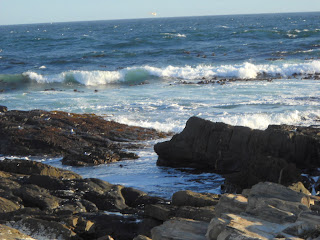This plaque is posted on a wall of the Nelson Mandela Gateway, where you board the ferry from Cape Town's V&A Waterfront to sail to Robben Island and it says:
"While we will not forget the brutality of apartheid we will not want Robben Island to be a monument of our hardship and suffering. We would want it to be a monument reflecting the triumph of the human spirit against the forces of evil; a triumph of wisdom and largeness of spirit against small minds and pettiness; a triumph of courage and determination over human frailty and weakness; a triumph of non-racialism over bigotry and intolerance; a triumph of the new South Africa over the old."
-- Ahmed Kathrada, ex-prisoner
When I visited Robben Island in 2009 I didn't remember hearing about the island's other most 'famous' prisoner, the first being Nelson Mandela. But as our tour guide pointed out to us this time, if you've never heard of Robert Sobukwe, it's because the Apartheid regime wanted it that way. He was a professor, linguist and president of the PAC (Pan Africanist Congress) who was imprisoned not for what he did BUT FOR WHAT HE MIGHT DO. So influential (i.e. 'dangerous') was he that the Apartheid government confined him to a little house built especially for him on the island and he was kept there in solitary confinement for nine years. Though he was given the special privilege of being allowed books and civilian clothing, he was not allowed to speak to anyone and this forced silence ruined his vocal cords. After he developed lung cancer, Sobukwe was released to house arrest in Kimberl, South Africa -- a place considered by the authorities to be sufficiently removed as to keep the rest of the country away from his ideas and influence. He died a few years later.
"While we will not forget the brutality of apartheid we will not want Robben Island to be a monument of our hardship and suffering. We would want it to be a monument reflecting the triumph of the human spirit against the forces of evil; a triumph of wisdom and largeness of spirit against small minds and pettiness; a triumph of courage and determination over human frailty and weakness; a triumph of non-racialism over bigotry and intolerance; a triumph of the new South Africa over the old."
-- Ahmed Kathrada, ex-prisoner
~ ~ ~
When I visited Robben Island in 2009 I didn't remember hearing about the island's other most 'famous' prisoner, the first being Nelson Mandela. But as our tour guide pointed out to us this time, if you've never heard of Robert Sobukwe, it's because the Apartheid regime wanted it that way. He was a professor, linguist and president of the PAC (Pan Africanist Congress) who was imprisoned not for what he did BUT FOR WHAT HE MIGHT DO. So influential (i.e. 'dangerous') was he that the Apartheid government confined him to a little house built especially for him on the island and he was kept there in solitary confinement for nine years. Though he was given the special privilege of being allowed books and civilian clothing, he was not allowed to speak to anyone and this forced silence ruined his vocal cords. After he developed lung cancer, Sobukwe was released to house arrest in Kimberl, South Africa -- a place considered by the authorities to be sufficiently removed as to keep the rest of the country away from his ideas and influence. He died a few years later.
The seas can be rough between the Cape Town and Robben island. Prisoners were usually taken over in the hold of a small vessel and on nights when the water was especially rough in order to sicken the them and start the process of breaking them down.
Looking at Cape Town and Table Mountain from the island.
Such a desolate place! But one that inspires nowadays thanks to the ex-prisoners and ex-guards who live together on the island in order to keep the history alive. To tell their stories.
A sample of the menu which was different (i.e. better) for the 'Colored' prisoners than for the 'Blacks'.
The documentation that a prisoner was to carry on his person at all times. If he was caught without it, food was withheld for either 24 or 48 hours.
The house built solely for Robert Sobukwe.
African penguins have taken up residence on the island now. There are also antelope, seabirds and rabbits who make the island home.
The lime quarry that the prisoners did their hard labor in and which eventually ruined both lungs and eyesight.
The cave in the quarry that came to be known as The University because it was the place where Nelson Mandela and the other ANC prisoners hammered out the constitution for a new South Africa. And from this 'university' emerged Mandela's quintessential philosophy: "Not revenge but reconciliation."
~ ~ ~
I think what struck me most this time was that while the guards were on the island to 'break' the prisoners, what in fact happened was that the guards (and their prisoners) broke the Apartheid regime thanks to the bonds of friendship and trust that eventually grew between these two groups.
Robben Island is both a beautiful place and a terrifying one. On our way back to Cape Town the winds came up and the waves gave us a wild ride. Like one of the men on the boat said as we left the harbor, "We're going to dance tonight!" And we did. I hung on tightly at my place in the center of the boat, keeping my face toward the open door (glad for both the fresh air and cold sea spray) and my eyes on the steadily darkening horizon.



















No comments:
Post a Comment